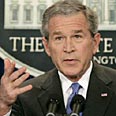
Poll: Americans distrust Bush on Iran
Los Angeles Times poll shows 54 percent distrust Bush in handling Iran crisis
The poll showed that 48 percent of Americans are in favor of a military attack on Iran, while 40 percent are against. The Bush administration rejected reports that it is preparing for military action against Iran.
A senior American official left for Moscow this week for a second round of talks aiming at reaching an understanding with permanent members of the United Nations Security Council on the course of action to be taken against Iran should it continue to defy a U.N. resolution calling on it to halt nuclear research.
The resolution set April 28 as a deadline for Iran to comply with the demands of the world body.
The Bush administration is hoping the latest declaration by Iranian President Mahmoud Ahmadinejad that his country has successfully enriched uranium will increase international pressure. R. Nicolas Burns, State Department under secretary for political affairs, left for Moscow where he will hold talks with officials from China, Russia, Britain, France and Germany.
Burns will bid to garner Chinese and Russian support for tough Security Council resolutions against Iran.
The senior officials from France, Germany, Britain, the United States, Russia and China will look at "real actions" the United Nations can take to get Iran to change its behavior, said State Department spokesman Sean McCormack.
The options under a Chapter 7 resolution under the U.N. charter could include a freeze on assets and travel restrictions on some members of the Iranian government, said McCormack.
"These are all levers at the disposal of the international community," McCormack told reporters.
Travel restrictions
While pushing for sanctions, U.S. officials said they would not look at imposing restrictions on the oil and gas sectors, pointing out the intention was not to create further hardship for the Iranian people.
In an interview with Voice of America's Persian language television program, Burns said Tehran would face sanctions and that Iran had left itself "no exit points" on the Iran issue.
"We very much hope that these sanctions will not be implemented bluntly in a way that would be damaging to the Iranian people, but it is going to be sanctions that will get the attention of the Iranian government," said Burns, who will represent the State Department at Tuesday's Moscow meetings.
Secretary of State Condoleezza Rice said a day earlier that the United Nations should consider a Chapter 7 resolution against Iran when it reconvenes, probably at the end of this month, to discuss Iran.
Chapter 7 makes a resolution mandatory under international law for all U.N. members. It can lead to sanctions and eventually the use of force if it specifically calls for them or threatens "all necessary measures."
Russia and China, key players on the Iran issue with veto rights in the Security Council, strongly oppose sanctions or the use of military force against Tehran. All other council members, including close ally Britain, oppose military action.
Reuters contributed to this report










